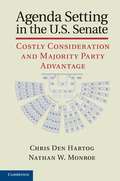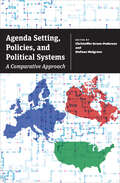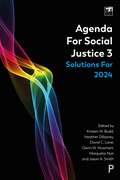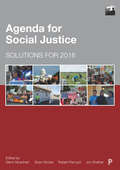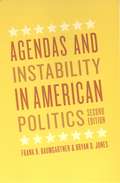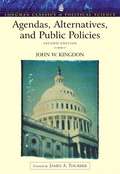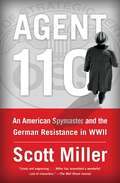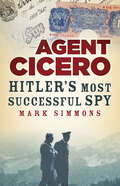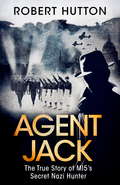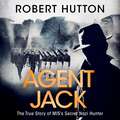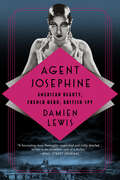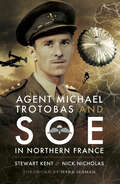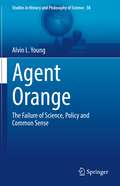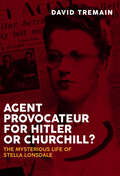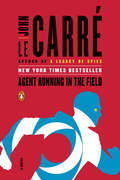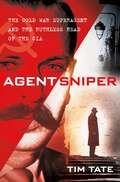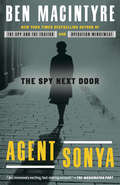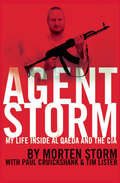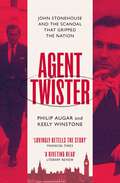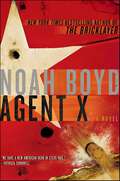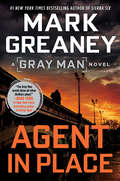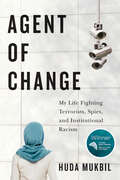- Table View
- List View
Agenda Setting in the U.S. Senate
by Chris Den Hartog Nathan W. MonroeProposes a new theory of Senate agenda setting that reconciles a divide in literature between the conventional wisdom - in which party power is thought to be mostly undermined by Senate procedures and norms - and the apparent partisan bias in Senate decisions noted in recent empirical studies. Chris Den Hartog and Nathan W. Monroe's theory revolves around a 'costly consideration' framework for thinking about agenda setting, where moving proposals forward through the legislative process is seen as requiring scarce resources. To establish that the majority party pays lower agenda consideration costs through various procedural advantages, the book features a number of chapters examining partisan influence at several stages of the legislative process, including committee reports, filibusters and cloture, floor scheduling and floor amendments. Not only do the results support the book's theoretical assumption and key hypotheses, but they shed new light on virtually every major step in the Senate's legislative process.
Agenda Setting, Policies, and Political Systems: A Comparative Approach
by Bryan D. Jones Peter John Sylvain Brouard Martial Foucault Éric Montpetit Frédéric Varone Will Jennings Shaun Bevan Isabelle Engeli Pascal Sciarini Anne Hardy Laura Chaqués-Bonafont Anna M. Palau Emiliano Grossman Arco Timmermans Isabelle Guinaudeau Christian Breunig Michelle C. Whyman Gerard Breeman Roy Gava Brandon Zicha Jeroen Joly Tobias Van Assche Enrico Borghetto Marcello Carammia Francesco Zucchini Luz M. Muñoz MarquezWhat will gain the system&’s attention? &“Explores the dynamics of a broad range of policy issues in different countries . . . an important scholarly contribution.&” —Political Studies Review Before making significant policy decisions, political actors and parties must first craft an agenda designed to place certain issues at the center of political attention. The agenda-setting approach in political science holds that the amount of attention devoted by the various actors within a political system to issues like immigration, health care, and the economy can inform our understanding of its basic patterns and processes. While there has been considerable attention to how political systems process issues in the United States, Christoffer Green-Pedersen and Stefaan Walgrave demonstrate the broader applicability of this approach by extending it to other countries and their political systems. This book brings together essays on eleven countries and two broad themes. Contributors to the first section analyze the extent to which party and electoral changes and shifts in the partisan composition of government have led—or not led—to policy changes in the United States, the United Kingdom, the Netherlands, Denmark, Switzerland, and France. The second section turns the focus on changing institutional structures in Germany, Italy, Belgium, Spain, and Canada, including the German reunification and the collapse of the Italian party system. Together, the essays make clear the efficacy of the agenda-setting approach for understanding not only how policies evolve, but also how political systems function.
Agenda for Social Justice 3: Solutions for 2024 (SSSP Agendas for Social Justice)
by Sophie Webb Teresa A. Sullivan Dana Johnson Blake R. Silver Katie Kerstetter Gabriela Gonzalez Ashley C. Rondini Ashley N. Gwathney Brooke Cordes Charity Anderson Drew Bonner Elroi Windsor Hayley Carlisle Jeanne Kimpel Kristen Burke Lance Hannon Lindsay Redditt McKenzie Berezin Meredith Van Natta Monique Harrison Nazgol Ghandnoosh Raquel Rose Sarah Jane Brubaker Sydney Ingel Tiffany Joseph Tony Samara Mary BernsteinThe Agenda for Social Justice 3: Solutions for 2024 provides accessible insights into some of the most pressing social problems and proposes public policy responses to those problems. Written by a highly respected team of authors brought together by the Society for the Study of Social Problems (SSSP), the book offers recommendations for action by elected officials, policymakers and the public regarding key issues for social justice. Chapters include discussion of social problems related to criminal justice, the economy, food insecurity, education, healthcare, housing and immigration. The book will be of interest to scholars, practitioners, advocates and students interested in public sociology, the study of social problems and the pursuit of social justice.
Agenda for Social Justice: Solutions for 2016 (SSSP Agendas for Social Justice)
by Glenn W. Muschert, Brian V. Klocke, Robert Perrucci, and Jon ShefnerThe Agenda for Social Justice: Solutions for 2016 provides accessible insights into some of the most pressing social problems in the United States and proposes public policy responses to those problems. Written by a highly respected team of authors brought together by the Society for the Study of Social Problems (SSSP), it offers recommendations for action by elected officials, policy makers, and the public around key issues for social justice, including a discussion of the role of key issues of sustainability and technology in the development and timbre of future social problems. It will be of interest to scholars, practitioners, advocates, and students interested in public sociology and the study of social problems.
Agendas and Instability in American Politics (2nd edition)
by Frank R. Baumgartner Bryan D. JonesWhen Agendas and Instability in American Politics appeared fifteen years ago, offering a profoundly original account of how policy issues rise and fall on the national agenda, the Journal of Politics predicted that it would "become a landmark study of public policy making and American politics." That prediction proved true and, in this long-awaited second edition, Bryan Jones and Frank Baumgartner refine their influential argument and expand it to illuminate the workings of democracies beyond the United States.The authors retain all the substance of their contention that short-term, single-issue analyses cast public policy too narrowly as the result of cozy and dependable arrangements among politicians, interest groups, and the media. Jones and Baumgartner provide a different interpretation by taking the long view of several issues--including nuclear energy, urban affairs, smoking, and auto safety--to demonstrate that bursts of rapid, unpredictable policy change punctuate the patterns of stability more frequently associated with government. Featuring a new introduction and two additional chapters, this updated edition ensures that their findings will remain a touchstone of policy studies for many years to come.
Agendas and Instability in American Politics (Chicago Studies In American Politics Ser.)
by Frank R. Baumgartner Bryan D. JonesWhen Agendas and Instability in American Politics appeared fifteen years ago, offering a profoundly original account of how policy issues rise and fall on the national agenda, the Journal of Politics predicted that it would “become a landmark study of public policy making and American politics.” That prediction proved true and, in this long-awaited second edition, Bryan Jones and Frank Baumgartner refine their influential argument and expand it to illuminate the workings of democracies beyond the United States. The authors retain all the substance of their contention that short-term, single-issue analyses cast public policy too narrowly as the result of cozy and dependable arrangements among politicians, interest groups, and the media. Jones and Baumgartner provide a different interpretation by taking the long view of several issues—including nuclear energy, urban affairs, smoking, and auto safety—to demonstrate that bursts of rapid, unpredictable policy change punctuate the patterns of stability more frequently associated with government. Featuring a new introduction and two additional chapters, this updated edition ensures that their findings will remain a touchstone of policy studies for many years to come.
Agendas, Alternatives and Public Policies
by John W. KingdonThis report on original research includes many down-to-earth illustrations and quotations from interviews, creating enjoyable and informative reading for undergraduate students.
Agendas, Alternatives, and Public Policies (2nd edition)
by John W. KingdonUnderstanding the complexity and dynamics of how the national agenda is set is essential to an explanation of the policy-making process in the United States. Locating the real policy agenda of the government requires an in-depth and prolonged analysis of broad arenas of political action, policy formulation, and policy definition. Prior to John W. Kingdon's Agendas, Alternatives, and Public Policies, first published in 1984, political scientists did not pay much attention to agenda setting. Kingdon's Agendas established an important theoretical foundation for all post-1984 scholarship on the policy-making process. He defines the policy agenda as "the list of subjects to which government officials and those around them are paying serious attention."
Agent 110: An American Spymaster and the German Resistance in WWII
by Scott Jeffrey MillerThe &“lively and engrossing&” (The Wall Street Journal) story of how OSS spymaster Allen Dulles built an underground network determined to take down Hitler and destroy the Third Reich.Agent 110 is Allen Dulles, a newly minted spy from an eminent family. From his townhouse in Bern, Switzerland, and in clandestine meetings in restaurants, back roads, and lovers&’ bedrooms, Dulles met with and facilitated the plots of Germans during World War II who were trying to destroy the country&’s leadership. Their underground network exposed Dulles to the political maneuverings of the Soviets, who were already competing for domination of Germany, and all of Europe, in the post-war period. Scott Miller&’s &“absorbing and bracing&” (The Seattle Times) Agent 110 explains how leaders of the German Underground wanted assurances from Germany&’s enemies that they would treat the country humanely after the war. If President Roosevelt backed the resistance, they would overthrow Hitler and shorten the war. But Miller shows how Dulles&’s negotiations fell short. Eventually he was placed in charge of the CIA in the 1950s, where he helped set the stage for US foreign policy. With his belief that the ends justified the means, Dulles had no qualms about consorting with Nazi leadership or working with resistance groups within other countries to topple governments. Agent 110 is &“a doozy of a dossier on Allen Dulles and his early days spying during World War II&” (Kirkus Reviews). &“Miller skillfully weaves a double narrative of Dulles&’ machinations and those of the German resistance&” (Booklist) to bring to life this exhilarating, and pivotal, period of world history—of desperate renegades in a dark and dangerous world where spies, idealists, and traitors match wits and blows to ensure their vision of a perfect future.
Agent 407: A South African Spy Tells Her Story
by Olivia ForsythIn the world of espionage, truth is the first victim and nothing is as it seems. Here, for the first time, South Africa's most notorious apartheid spy Olivia Forsyth lays bare the story of her remarkable life. Olivia Forsyth was a romantic young woman in search of adventure when she joined the Security Police with visions of international derring-do. But Craig Williamson, her unit head, had other ideas and Olivia was trained to spy on students before being dispatched to Rhodes University, a supposed 'hotbed' of anti-apartheid radicalism. It wasn't long before Olivia had infiltrated various student organisations, feeding vital information back to her handler. She came to hold prominent positions on campus and, as reward, was promoted to Lieutenant. Having reached the end of her studies, Olivia set her sights on a much more ambitious - and dangerous - target: the ANC in exile. But what should have been her greatest triumph as a spy turned into disaster when the ANC threw her into Quatro, the notorious internment camp in Angola. This is a riveting story set in the final years of apartheid.
Agent Cicero: Hitler’s Most Successful Spy
by Mark SimmonsElyesa Bazna was the highest-paid spy in history. Working for the British ambassador in Ankara in 1943, Bazna photographed top-secret documents and sold them to the Nazis. So started his career as a ‘walk-in’, a freelance spy whose loyalties lay with the highest bidder. His codename was Cicero. But a beautiful woman was to end it all.Cicero was compromised by an American-controlled agent working at the German Embassy, who obtained his code name and discovered that he was working at the British Embassy. He fled and narrowly avoided being captured by the tipped-off British. Finally free, he realised his money was worthless – most of it was counterfeit, produced by the Nazi scheme Operation Bernhard.Mark Simmons weaves together personal accounts by the leading characters and information from top-secret files from MI5, MI6 and the CIA to tell the astonishing story of Agent Cicero.
Agent Jack: The True Story of MI5's Secret Nazi Hunter
by Robert Hutton'Highly readable' Ben Macintyre'Pacy, original and frequently chilling' Henry HemmingJune 1940. Britain is Europe's final bastion of freedom - and Hitler's next target. But not everyone fears a Nazi invasion. In factories, offices and suburban homes are men and women determined to do all they can to hasten it.Throughout the Second World War, Britain's defence against the enemy within was Eric Roberts, a former bank clerk from Epsom. Equipped with an extraordinary ability to make people trust him, he was recruited into the shadowy world of espionage by the great spymaster Maxwell Knight. Roberts penetrated first the Communist Party and then the British Union of Fascists, before playing his greatest role for MI5 - as Hitler's man in London. Codenamed Jack King, he single-handedly built a network of hundreds of British Nazi sympathisers, with many passing secrets to him in the mistaken belief that he was a Gestapo officer. Operation Fifth Column, run by a brilliant woman scientist and a Jewish aristocrat with a sideline in bomb disposal, was kept so secret it was omitted from the reports MI5 sent to Winston Churchill. In a narrative that grips like a thriller, Robert Hutton tells the fascinating story of an operation whose existence has only recently come to light. Drawing on newly declassified documents and private family archives, Agent Jack shatters the comfortable notion that Britain could never have succumbed to fascism, and celebrates - at last - the courage of individuals who protected the country they loved at great personal risk.
Agent Jack: The True Story of MI5's Secret Nazi Hunter
by Robert HuttonJune 1940. Britain is Europe's final bastion of freedom - and Hitler's next target. But not everyone fears a Nazi invasion. In factories, offices and suburban homes are men and women determined to do all they can to hasten it.Throughout the Second World War, Britain's defence against the enemy within was Eric Roberts, a former bank clerk from Epsom. Equipped with an extraordinary ability to make people trust him, he was recruited into the shadowy world of espionage by the great spymaster Maxwell Knight. Roberts penetrated first the Communist Party and then the British Union of Fascists, before playing his greatest role for MI5 - as Hitler's man in London. Codenamed Jack King, he single-handedly built a network of hundreds of British Nazi sympathisers, with many passing secrets to him in the mistaken belief that he was a Gestapo officer. Operation Fifth Column, run by a brilliant woman scientist and a Jewish aristocrat with a sideline in bomb disposal, was kept so secret it was omitted from the reports MI5 sent to Winston Churchill. In a narrative that grips like a thriller, Robert Hutton tells the fascinating story of an operation whose existence has only recently come to light. Drawing on newly declassified documents and private family archives, Agent Jack shatters the comfortable notion that Britain could never have succumbed to fascism, and celebrates - at last - the courage of individuals who protected the country they loved at great personal risk.Read by Roger Davis(P) Orion Publishing Group 2018
Agent Josephine: American Beauty, French Hero, British Spy
by Damien LewisThe New Yorker, Best Books of 2022 Vanity Fair, Best Books of 2022 Booklist, Best Books of 2022 Singer. Actress. Beauty. Spy. During WWII, Josephine Baker, the world's richest and most glamorous entertainer, was an Allied spy in Occupied France. Prior to World War II, Josephine Baker was a music-hall diva renowned for her singing and dancing, her beauty and sexuality; she was the highest-paid female performer in Europe. When the Nazis seized her adopted city, Paris, she was banned from the stage, along with all &“negroes and Jews.&” Yet instead of returning to America, she vowed to stay and to fight the Nazi evil. Overnight, she went from performer to Resistance spy. In Agent Josephine, bestselling author Damien Lewis uncovers this little-known history of the famous singer&’s life. During the war years, as a member of the French Nurse paratroopers—a cover for her spying work—Baker participated in numerous clandestine activities and emerged as a formidable spy. In turn, she was a hero of the three countries in whose name she served—the US, France, and Britain. Drawing on a plethora of new historical material and rigorous research, including previously undisclosed letters and journals, Lewis upends the conventional story of Josephine Baker, explaining why she fully deserves her unique place in the French Panthéon.
Agent Michael Trotobas and SOE in Northern France
by Nick Nicholas Stewart KentThe exceptional exploits, courage and leadership of British SOE Agent Trotobas have long been recognised in France but not in his own country despite being recommended for the Victoria Cross.Captured on his first mission, Trotobas led a mass break-out from Mauzac Internment Camp and eventually returned to England. He immediately volunteered to return and established and ran a resistance group around Lille and the Pas de Calais for a year. As the Nazis closed in, he refused to leave the French men and women who had shown him complete loyalty. He paid the ultimate price, fighting to the death rather than undergo capture.As well as describing the operations of the Sylvestre-Farmer circuit, the authors record the rivalries and intrigues that sprang up culminating in betrayals and extraordinary demand for the court martial and execution of the Circuit's British second in command.This book is a major addition to the bibliography of the SOE and French Resistance.
Agent Orange: The Failure of Science, Policy and Common Sense (Studies in History and Philosophy of Science #58)
by Alvin L. YoungThis book tells the story of Agent Orange, its usage and the policies that surround it. Agent Orange contains a contaminant known as TCDD. It was the most widely used defoliant from 1965 – 1970 and became one of three major tactical herbicides used in Vietnam. More than 45 major health studies were conducted with Vietnam veterans from the United States, Australia, New Zealand, and Korea seeking a relationship between veterans’ health and TCDD. Allegations of birth defects in the families of Vietnam veterans and the Vietnamese represented a case study in propaganda and deliberate misinformation by the government of Vietnam. The Policies of the US Government implemented by Congress and the Department of Veterans Affairs (DVA) identified 17 recognized associated presumptive diseases that failed the tests of “cause and effect” and common sense. This book tells the story of Agent Orange, its usage, the health studies and those policies from a diverse range of perspectives, delving into science, statistics, history, policy and ethics. It is of interest to scholars engaged in history, political and social philosophy and ethics.
Agent Provocateur for Hitler or Churchill?: The Mysterious Life of Stella Lonsdale
by David TremainThere have been many remarkable women who served British Intelligence during the Second World War. One whose dubious claim to have worked for them is a fascinating tale involving three marriages – the first, to a spurious White Russian prince; the second to a playboy-turned-criminal involved in a major jewellery robbery in the heart of London’s Mayfair in the late 1930s. After the war she became romantically involved with a well-known British Fascist, but finally married another notorious criminal whom she had met earlier during the war. The descriptions variously ascribed to her ranged from ‘remarkable’ and ‘quite ravishing’ to ‘…a woman whose loose living would make her an object of shame on any farm-yard’. Until now, very little has been recorded about Stella Lonsdale’s life. She doesn’t even merit a mention in the two official histories of MI5, even though she managed to tie them up in knots for years. This book will explore the role this strange woman may or may not have played in working for British Intelligence, the French Deuxième Bureau, or the Abwehr – German military intelligence – during the Second World War, using her MI5 files as a primary source.
Agent Running in the Field
by John le CarréA new novel from the #1 New York Times bestselling author John le CarréSet in London in 2018, Agent Running in the Field follows a twenty-six year old solitary figure who, in a desperate attempt to resist the new political turbulence swirling around him, makes connections that will take him down a very dangerous path. In his plot and characterization le Carré is as thrilling as ever and in the way he writes about our times he proves himself, once again, to be the greatest chronicler of our age.
Agent Sniper: The Cold War Superagent and the Ruthless Head of the CIA
by Tim TateThe thrilling never-before-told story of Agent Sniper, one of the Cold War's most effective counter-agentsMichal Goleniewski, cover name Sniper, was one of the most important spies of the early Cold War. For almost three years, as a Lieutenant Colonel at the top of Poland’s espionage service, he smuggled thousands of top-secret Soviet bloc intelligence and military documents, as well as 160 rolls of microfilm, from behind the Iron Curtain. Then, in January 1961, he abandoned his wife and children to make a dramatic defection across divided Berlin with his East German mistress to the safety of American territory. There, he exposed more than 1,600 Soviet bloc agents operating undercover in the West—more than any single spy in history. The CIA called Goleniewski “one of the West’s most valuable counterintelligence sources,” but in late 1963, he was abandoned by the US government because of a split inside the agency, and over questions about his mental stability and his trustworthiness. Goleniewski bears some of the blame for his troubled legacy: He made baseless assertions about his record, notably that he was the first to expose Kim Philby. He also bizarrely claimed to be Tsarevich Aleksei Romanoff, heir to the Russian Throne who had miraculously survived the 1918 massacre of his family. For more than fifty years, American and British intelligence services have sought to erase Goleniewski from the history of Cold War espionage. The vast bulk of his once-substantial CIA and MI5 files remain closed. Only fragments of his material crop up in the de-classified dossiers on the KGB spies he exposed or the memoirs of CIA officers who dealt with him, but his newly-released Polish intelligence file reveals the remarkable extent of his espionage on behalf of the West. A never-before-told story that brings together love and loyalty, courage and treachery, betrayal, greed and, ultimately, insanity, Tim Tate's Agent Sniper is a crackling page-turner that takes readers back to the post-war world and a time when no one was what they seemed.
Agent Sonya: Moscow's Most Daring Wartime Spy
by Ben MacintyreNEW YORK TIMES BESTSELLER • The &“master storyteller&” (San Francisco Chronicle) behind the New York Times bestseller The Spy and the Traitor uncovers the true story behind one of the Cold War&’s most intrepid spies.&“[An] immensely exciting, fast-moving account.&”—The Washington Post ONE OF THE BEST BOOKS OF THE YEAR: Foreign Affairs, Kirkus Reviews, Library JournalIn 1942, in a quiet village in the leafy English Cotswolds, a thin, elegant woman lived in a small cottage with her three children and her husband, who worked as a machinist nearby. Ursula Burton was friendly but reserved, and spoke English with a slight foreign accent. By all accounts, she seemed to be living a simple, unassuming life. Her neighbors in the village knew little about her.They didn&’t know that she was a high-ranking Soviet intelligence officer. They didn&’t know that her husband was also a spy, or that she was running powerful agents across Europe. Behind the facade of her picturesque life, Burton was a dedicated Communist, a Soviet colonel, and a veteran agent, gathering the scientific secrets that would enable the Soviet Union to build the bomb.This true-life spy story is a masterpiece about the woman code-named &“Sonya.&” Over the course of her career, she was hunted by the Chinese, the Japanese, the Nazis, MI5, MI6, and the FBI—and she evaded them all. Her story reflects the great ideological clash of the twentieth century—between Communism, Fascism, and Western democracy—and casts new light on the spy battles and shifting allegiances of our own times.With unparalleled access to Sonya&’s diaries and correspondence and never-before-seen information on her clandestine activities, Ben Macintyre has conjured a page-turning history of a legendary secret agent, a woman who influenced the course of the Cold War and helped plunge the world into a decades-long standoff between nuclear superpowers.
Agent Storm: My Life Inside al Qaeda and the CIA
by Morten Storm Paul Cruickshank Tim ListerThe true story of a jihadi convert seeking redemption in “a rollicking read and a rare insider’s account of Western spying in the age of al Qaeda”(The New York Times Book Review). Standing over six feet tall with flaming red hair, Morten Storm was an unlikely jihadi. But after a troubled youth in his native Denmark, Storm found peace and purpose in his conversion to Islam. His absolute devotion only grew after he attended a militant madrasa in Yemen, named his son Osama, and became close friends with American-born terrorist cleric Anwar al-Awlaki. Then, after a decade of jihadi life, he not only rejected extremism—he began a quest for atonement, becoming a double agent for the CIA as well as British and Danish intelligence agencies. Agent Storm takes readers inside the fanatical jihadist mindset and into the shadows of the world’s most powerful spy agencies in an action-packed account that “reads like a screenplay for a James Bond movie written by Joel and Ethan Coen” (The Washington Post).
Agent Twister: The True Story Behind the Scandal that Gripped the Nation
by Philip Augar Keely WinstoneHe lived a double-life in the sixtiesFaked his own death in the seventiesAnd retained his cover in the eighties A period thriller with powerful political and espionage themes, Agent Twister is the remarkable story behind one of the greatest scandals of the 1970s, told in full for the first time. If you think you know the true story of John Stonehouse – think again.It&’s November 1974 and John Stonehouse MP, once a star in Harold Wilson&’s Labour government, is missing in Miami, presumed drowned. His disappearance exposes the most lurid details of his life, including identity fraud, corporate corruption, a love triangle, blackmail, links with the Mafia and a decade-long career as a Soviet spy. The public are gripped by this story, happy to forget the strikes, IRA bombs and rising prices that are making daily life a misery. On Christmas Eve, Stonehouse is tracked down in Melbourne, Australia, where he is suspected of being that other missing Englishman, Lord Lucan. The comic absurdity of the story is offset by claims of a mental breakdown and a refusal to resign as an MP, even when he is extradited back to the UK and up on charges at the Old Bailey. For the first time, Agent Twister reveals the corporate crimes at the heart of Stonehouse&’s business empire, the true extent of his ten-year collusion with powerful Soviet proxies and the political consequences of his antics. It&’s a scandal greater than Profumo that lay buried for thirty years, with three prime ministers – Wilson, Callaghan and Thatcher – covering it up for very different reasons. Written by the makers of the Channel Four documentary The Spy Who Died Twice, Agent Twister is the first impartial account to put this extraordinary scandal in political context and reveal why John Stonehouse really disappeared.
Agent X: A Novel (Steve Vail Novels Ser. #2)
by Noah BoydIn this espionage thriller from a New York Times–bestselling author, a former FBI agent hunts down an elusive Russian Spy.The follow-up to Noah Boyd's debut thriller The Bricklayer—basis for the movie starring Nina Dobrev and Aaron Eckhart.Ex-FBI agent Steve Vail is looking forward to a well-earned and romantic New Years Eve in Washington, DC, when he quickly finds himself knee-deep in a very complicated and unusual case.A man known simply as Calculus has approached the FBI claiming he has a list naming several Americans who are supplying confidential government information to the Russian secret service. All he asks in exchange for the list is a quarter of a million dollars for each traitor the FBI nabs. But then Calculus informs the FBI that he’s been recalled to Moscow, and the Bureau suspects the worst: the Russians are onto him, probably have access to his list, and will be after the traitors unless the FBI can find them first.The FBI knows they have to stay one step ahead of the Russians, and, without knowing exactly who is on the list, keep the operation quiet. Once again, Vail is their man. He’s the perfect guy for this kind of under-the-radar investigation. But finding Calculus and his list of turncoats isn’t going to be easy. In fact, it’s going to be downright deadly.“We have a new American hero in Steve Vail.” —Patricia Cornwell“Vail is in the mold of Lee Child’s Jack Reacher and Robert Crais’s Joe Pike. . . . This guy has movie written all over him.” —Chicago Sun-Times
Agent in Place (Gray Man #7)
by Mark Greaney<P> From Mark Greaney, the New York Times bestselling author of Gunmetal Gray and the coauthor of Tom Clancy's Jack Ryan novels, comes a high-stakes thriller featuring the world's most dangerous assassin: the Gray Man. <P> Fresh off his first mission back with the CIA, Court Gentry secures what seems like a cut-and-dried contract job: A group of expats in Paris hires him to kidnap the mistress of Syrian dictator Ahmed Azzam to get intel that could destabilize Azzam's regime. Court delivers Bianca Medina to the rebels, but his job doesn't end there. She soon reveals that she has given birth to a son, the only heir to Azzam's rule--and a potent threat to the Syrian president's powerful wife. Now, to get Bianca's cooperation, Court must bring her son out of Syria alive. With the clock ticking on Bianca's life, he goes off the grid in a free-fire zone in the Middle East--and winds up in the right place at the right time to take a shot at bringing one of the most brutal dictatorships on earth to a close... <P><b> A New York Times Bestseller</b>
Agent of Change: My Life Fighting Terrorists, Spies, and Institutional Racism
by Huda MukbilIn Agent of Change Huda Mukbil takes us behind the curtain of a leading spy agency during a fraught time, recounting her experiences as an intelligence officer for the Canadian Security Intelligence Service. Mukbil was the first Black Arab-Canadian Muslim woman to join CSIS and was at the forefront of the fight against terrorism after 9/11.Mukbil’s mastery of four languages quickly made her a counterterrorism expert and a uniquely valuable asset to the organization. But as she worked with colleagues to confront new international threats, she also struggled for acceptance and recognition at the agency. Following the American-led invasion of Iraq in 2003 and the rise of homegrown extremism, Mukbil was framed as an inside threat. Determined to prove her loyalty, while equally concerned about the surveillance and profiling of Muslims and revelations of Western agencies’ torture and torture by proxy, Mukbil started to question CSIS’s fluctuating ethical stance in relation to its mandate. Her stellar work on a secondment to MI5, the British Security Service, earned commendation; this shielded her, but only temporarily, from the hostile workplace culture at CSIS. Ultimately, Mukbil and a group of colleagues went public about the pervasive institutional discrimination undermining CSIS and national security from within.Mukbil’s expertise in international security and her commitment to workplace transparency drove important changes at CSIS. Dazzlingly written, her account is an eye-opener for anyone wanting to understand how racism, misogyny, and Islamophobia undermine not only individuals, but institutions and the national interest – and how addressing this openly can tackle populism and misinformation.
